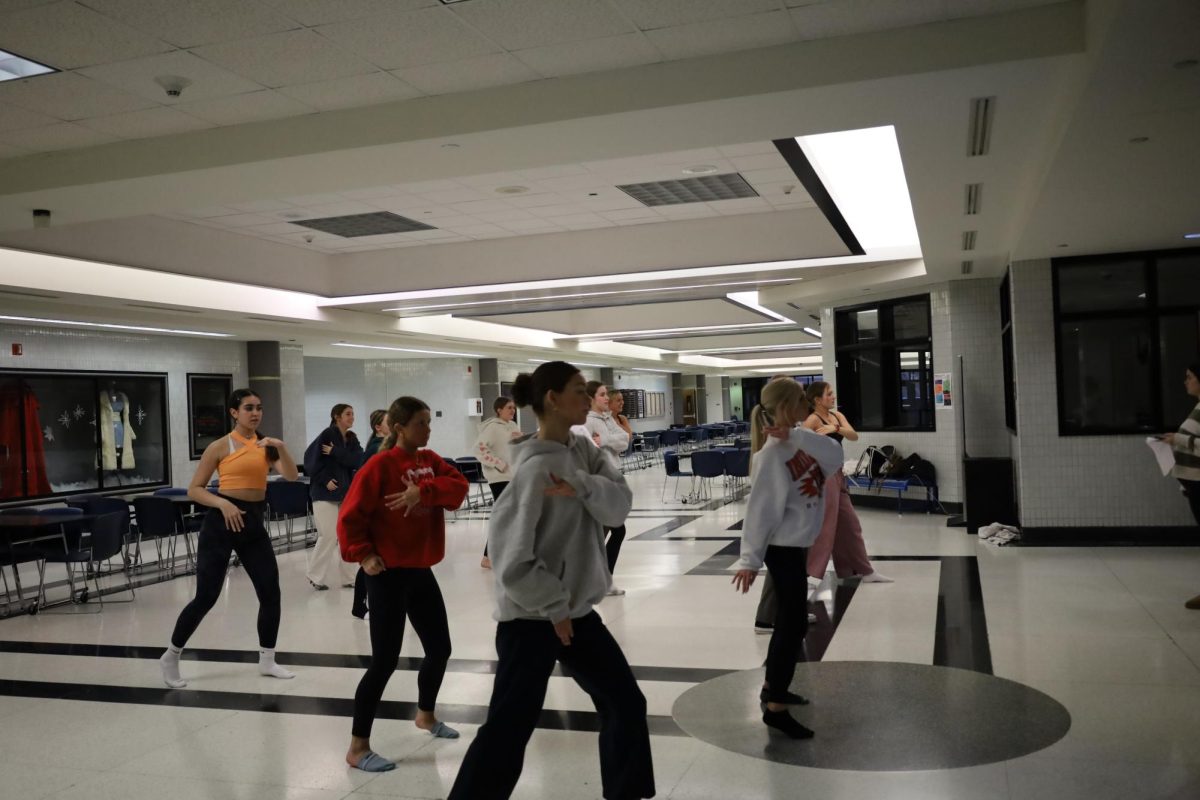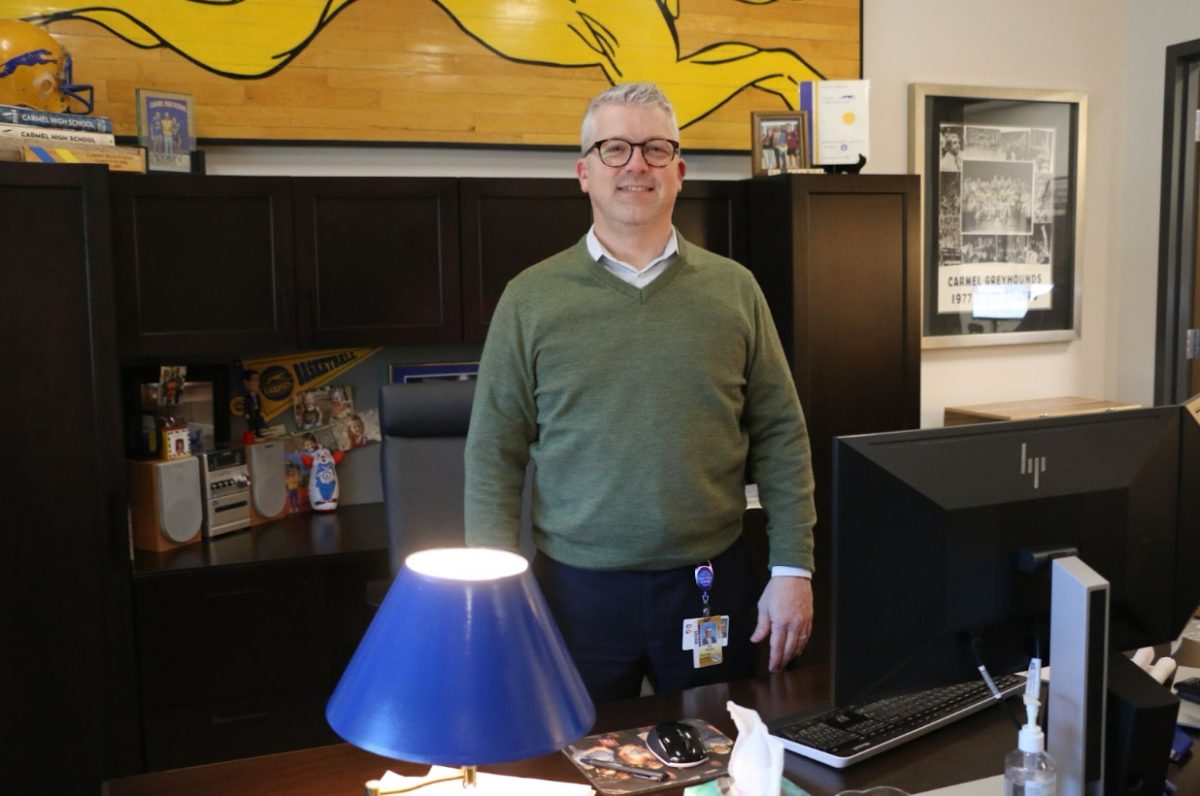Sophomore Jeannette Hommel lays sprawled on the floor, typing away on her laptop. Lit candles flicker nearby, wafting pumpkin scents around her. Hommel has deliberately placed the computer on a whiteboard—in preparation of the laptop overheating and in order to avoid “accidentally setting the carpet on fire.” Soft instrumental music plays, set to the mood of the scene, the very scene she’s about to write. Everything is ready at her writing station for words and words and words to pour out of her until an entire 50,000-word novel is finished.
This November, Hommel is participating once again in National Novel Writing Month (NaNoWriMo) and attempting to complete the challenge of writing an entire 50,000-word novel in just 30 days, joining more than 200,000 people across the globe. Her idea for this year takes on a satirical view about the current political divide, as it includes four characters with distinctly opposing political views who have to learn to work together.
However, writing for fun outside of school can be a foreign concept to many. After all, students are already assigned plenty of academic papers in their classes all the time—from persuasive essays, to informative papers, to literature analyses. So why would anyone still turn to creative writing outside of school, let alone the challenge of finishing an entire novel in one month?
According to Annie Sullivan, the author of A Touch of Gold, the reasons for students to write creatively can vary, yet she personally said she has found writing fiction allows for so much more freedom. The simple, deliberate choice of writing for pleasure rather than doing it for a grade makes a major difference to her.
“School assignments are about getting a good grade and catering to what a teacher wants. Writing for fun is about writing for you,” Sullivan said via email. “It’s about writing about the topics that you often don’t get to write about in class, whether that’s dragons and mermaids or space aliens and talking dogs.”
Hommel said she agreed, adding that she often finds academic papers harder to write, perhaps even a harder challenge than writing a novel in one month.
“In academic papers, you have to explain every single detail. Everything has to be laid out and explained… it’s like you have to explain it to a baby, and I just can’t do that. I just expect everyone to get my whole word vomit of ideas,” Hommel said.
Although NaNoWriMo may fit her creative style better, the challenge is still not necessarily “easy” to Hommel—in fact, she hasn’t been successful every time. She’s attempted the challenge several times before, and this year will mark her third time participating. In 2016, Hommel successfully completed the challenge, ending on Nov. 30 with a 70,000-word draft about a North Korean young girl who eventually became disillusioned of her government. While last year she wasn’t able to reach her 50,000-word goal, Hommel said she hopes she can rebound this year if she is able to manage her time wisely between NaNoWriMo, school assignments and her extracurriculars.
In contrast to the complete focus on academic writing in most English classes, creative writing teacher Eugenie Baum said writing creatively may not necessarily be a waste of time; rather, it could be valuable in improving academic writing skills as well.
“I think writing creatively benefits all writing,” Baum said. “The more that we can get students to write and write expressively and not worry so much about a grade and grammar and things like that—if we can just get students to write more and express themselves in writing—we’ll definitely see benefits in their academic writing, because they’re learning to write in ways that demonstrates their understanding.”
In other words, although creative writing is often an endeavor students undertake for fun, the so-called “hobby” brings tangible benefits to writing assignments for school, such as to academic papers. Baum adds that writing expressively is vital to both academic and creative writing pieces, as it helps bring readers in.
Another reason many people are drawn to creative writing is not necessarily the benefits it can offer academically, but rather the opportunity of expression it provides the writer.
Hommel said she’s always enjoyed creating stories, and it often used to be through drawings when she was younger. In fact, remember that white board that Hommel’s laptop is sitting on? That very whiteboard is often filled with drawings she creates from dry erase markers, drawings that are potential novel ideas. However, it wasn’t until eighth grade when Hommel began to pour out the stories in her head through writing.
Hommel said, “I’ve always been a creative person, and I’ve always enjoyed making up stories in my head. I never really had a lot of social interactions as an elementary schooler so I would often spend my time creating stories, and mostly I would do that through drawing… When in eighth grade we had the option to do NaNoWriMo I was like, ‘yeah I should do that.’”
Now, because of an optional eighth-grade assignment, Hommel already has various drafts of a completed, albeit unpolished, novel, simply stemming from a desire to pour out her ideas and express herself.
Sullivan had a similar motivation behind choosing to become an author as well; she said she felt that her novels were parts of her and that only could have come from her. Everyone has their own unique ideas, and writing is a way to express that originality.
“I chose to become a writer because I just loved telling stories,” Sullivan said. “It feels like I’m the only one that can tell these unique stories that are flying around in my head, or have been for years… I write because I have stories inside me—stories only I can tell. No one else is thinking about writing about the cursed daughter of King Midas, but I am. Writing is a way for my imagination to come to life.”
Adding on to self-expression, creative writing can also provide many emotional and mental benefits for both the writer and the reader.
“I think (writing creatively) helps people relax. I think it helps people express themselves in ways the maybe they can’t otherwise,” Baum said. “It’s definitely an art form; we read books because we have great writers. And I also think it’s just a way to kind of explore yourself. And I think we all, in some way, whether we want to admit it or not, are always on this (path of) self-exploration, and writing creatively is a way to do it, whether you do it through journaling, or poetry, or your stories, we are always connecting to ourselves in some shape or form through that writing.”
Sullivan added that for her, writing may not only help herself on the path of self-exploration, but she hopes to use her writing to help others on their paths as well.
“Writing can not only help us work through our own problems, but they can inspire others to work through theirs too,” Sullivan said. “For example, Kora, the protagonist in A Touch of Gold, deals with anxiety, broken family relationships, and bullying. These are issues students your age may deal with, so maybe someone needs Kora’s example to work through what they’re going through—or to even see that someone else made it through.”
In the end, however, the simple sense of accomplishment may be enough of a reward.
“It helps me feel accomplished in some way because I feel like with a lot of the school work and with grades and all—even if I get a solid A at the end of the year—I don’t (necessarily) feel accomplishment in life,” Hommel said. “But with writing, even from just the one book that I made two years ago, it still gives me a sense of accomplishment… It was such a great feeling to have made something because I’ve never written anything that long.”
Yet while the writing can create so many benefits, whether it be self-reflection or a sense of accomplishment, Hommel said she didn’t start writing because of an end result. She likely didn’t start NaNoWriMo with the intention of “self-exploration” or “inspiring others” either. Instead, she was just writing for herself. And that is the simple joy in creative writing.
After all, as Sullivan said, “Write what you love. That’s when you’ll be doing your best writing. You never know when someone out there needs the story that you’ve got inside you—and we’ve all got stories inside us to share.”



















![Joseph Broman, Mu Alpha Theta sponsor, grades tests for his honors precalculus/trigonometry class. Broman said, “I’m retiring from the Math Club next year and I’m just going to do Mu Alpha Theta so I can focus on that one and we can do more [speaker series] first semester.”](https://hilite.org/wp-content/uploads/2024/03/IMG_9502-1200x900.jpg)











![British royalty are American celebrities [opinion]](https://hilite.org/wp-content/uploads/2024/03/Screenshot-2024-03-24-1.44.57-PM.png)




















![Review: “The Iron Claw” cannot get enough praise [MUSE]](https://hilite.org/wp-content/uploads/2024/04/unnamed.png)
![Review: “The Bear” sets an unbelievably high bar for future comedy shows [MUSE]](https://hilite.org/wp-content/uploads/2024/03/unnamed.png)
![Review: “Mysterious Lotus Casebook” is an amazing historical Chinese drama [MUSE]](https://hilite.org/wp-content/uploads/2024/03/0.webp)
![Thea Bendaly on her Instagram-run crochet shop [Biz Buzz]](https://hilite.org/wp-content/uploads/2024/03/IMG_0165-1200x838.jpg)
![Review: Sally Rooney’s “Normal People,” is the best book to read when you are in a time of change [MUSE]](https://hilite.org/wp-content/uploads/2024/03/20047217-low_res-normal-people.webp)
![Review in Print: Maripaz Villar brings a delightfully unique style to the world of WEBTOON [MUSE]](https://hilite.org/wp-content/uploads/2023/12/maripazcover-1200x960.jpg)
![Review: “The Sword of Kaigen” is a masterpiece [MUSE]](https://hilite.org/wp-content/uploads/2023/11/Screenshot-2023-11-26-201051.png)
![Review: Gateron Oil Kings, great linear switches, okay price [MUSE]](https://hilite.org/wp-content/uploads/2023/11/Screenshot-2023-11-26-200553.png)
![Review: “A Haunting in Venice” is a significant improvement from other Agatha Christie adaptations [MUSE]](https://hilite.org/wp-content/uploads/2023/11/e7ee2938a6d422669771bce6d8088521.jpg)
![Review: A Thanksgiving story from elementary school, still just as interesting [MUSE]](https://hilite.org/wp-content/uploads/2023/11/Screenshot-2023-11-26-195514-987x1200.png)
![Review: When I Fly Towards You, cute, uplifting youth drama [MUSE]](https://hilite.org/wp-content/uploads/2023/09/When-I-Fly-Towards-You-Chinese-drama.png)
![Postcards from Muse: Hawaii Travel Diary [MUSE]](https://hilite.org/wp-content/uploads/2023/09/My-project-1-1200x1200.jpg)
![Review: Ladybug & Cat Noir: The Movie, departure from original show [MUSE]](https://hilite.org/wp-content/uploads/2023/09/Ladybug__Cat_Noir_-_The_Movie_poster.jpg)
![Review in Print: Hidden Love is the cute, uplifting drama everyone needs [MUSE]](https://hilite.org/wp-content/uploads/2023/09/hiddenlovecover-e1693597208225-1030x1200.png)
![Review in Print: Heartstopper is the heartwarming queer romance we all need [MUSE]](https://hilite.org/wp-content/uploads/2023/08/museheartstoppercover-1200x654.png)























![Review: Ladybug & Cat Noir: The Movie, departure from original show [MUSE]](https://hilite.org/wp-content/uploads/2023/09/Ladybug__Cat_Noir_-_The_Movie_poster-221x300.jpg)

![Review: Next in Fashion season two survives changes, becomes a valuable pop culture artifact [MUSE]](https://hilite.org/wp-content/uploads/2023/03/Screen-Shot-2023-03-09-at-11.05.05-AM-300x214.png)
![Review: Is The Stormlight Archive worth it? [MUSE]](https://hilite.org/wp-content/uploads/2023/10/unnamed-1-184x300.png)



